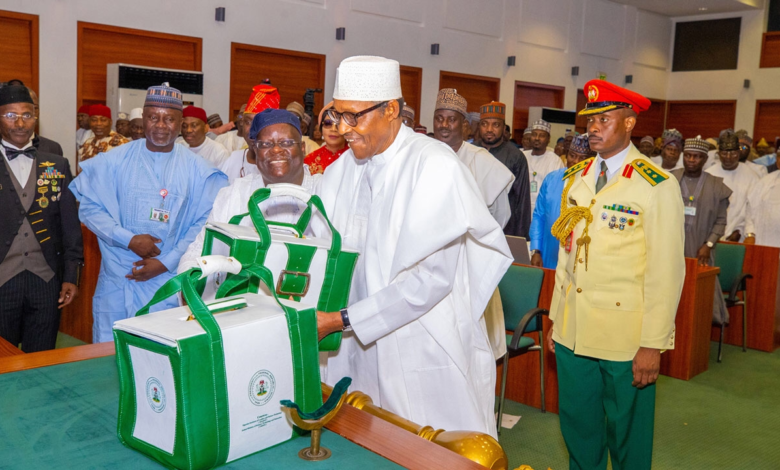Budget deficit: Operators fume as FG’s borrowings undermine real sector

President Muhammadu Buhari during the presentation of the 2023 budget to the joint session of the National Assembly in Abuja… yesterday. PHOTO: PHILIP OJISUA. INFOGRAPHICS: OLAKUNLE OLANIYI
By guardian.ng
• Borrowing plan will aggravate economic woes, experts warn
• Stakeholders skeptical on manufacturing sector growth prospects
• Operators urge FG to channel funds to productive activities
Excessive government borrowing from the capital market is posing a danger to the capacity of the real sector to create wealth and create employment, stakeholders have said.
In separate interviews with The Guardian, they said this situation has been exacerbated by the worsening economy, which has continued to impact negatively on manufacturing firms, depressing their working capital and shrinking companies’ profit margins, leaving a good number of firms on the verge of collapse.
Amid the nation’s burgeoning debt profile, President Muhammadu Buhari, last Friday, presented the 2023 budget proposal to the National Assembly, demanding new loans totalling N8.8 trillion to part finance a deficit of N10.78 trillion.
The total budget size is N20.51 trillion, which is N750 billion above the N19.76 trillion approved by the Senate and the House of Representatives in the Medium Term Expenditure Framework (MTEF) and Fiscal Strategy Paper (FSP) passed last Wednesday and Thursday by both chambers.
The nation’s debt rose from N39.6 trillion in December 2021 to N42.8 trillion in June 2022. According to the President, the rising deficit was due to high debt servicing resulting from rising interest rates. In the proposed spending for next year, N6.31 trillion will go to debt servicing.
With mounting debt obligations, economists have expressed fear about the extent to which the Federal Government is overheating the capital market with a bond listing.
They argued that if government continues to dominate the market with the current rate of borrowing, the private sector would be crowded out of the credit market.
According to the experts, recent statistics on government revenue showed poor performance and mounting expenditure, suggesting that Nigeria is facing a financial crisis.
The economists argued that the ability to service the nation’s rising debt is already impaired, while the economy is now deprived of fiscal space.
They insisted that fresh attempts to borrow more from the same domestic capital market would overstretch it to the extent that the private sector will be crowded out of the market.
Consequently, they argued that the resultant rising production cost would stifle growth of the private sector and the job-creating capacity of the economy.
Hence, they stressed the need for government to significantly curtail public borrowing to lower the cost of funds and make local production more competitive.
To bridge this year’s budget deficit, FG in the first half (H1) of 2022 raised a total of N1.84 trillion through the FGN bond market to finance the N7.35 trillion budget deficit.
Professor of Finance, University of Nigeria Nsukka, Chuke Nwude, said it was obvious there is a problem with FG’s participation in the debt market.
According to him, the major issue is that government continues to incur liabilities without improving the quality of its balance sheet, while it jettisons the Fiscal Responsibility Act (FRA) that borrowing should only be embarked upon to fund projects with strong cash flow.
“The latest attempt to borrow more from the same domestic capital market will overstretch the market to the extent that the private sector is crowded out of the capital market.
“Again, who is sure that FG is not borrowing this time to fund the coming elections? If that is the game plan, more liabilities without certain repayment sources will be created.
“Added to the rising oil theft and wasteful expenditures by Ministries, Departments and Agencies (MDAs), the country is in for more terrible days. With the shrinking purse or savings from households and firms, I foresee a downturn for the market.”
A political economist, Prof. Pat Utomi, pointed out that when incurring obligations, whether domestic or foreign, it would be appropriate to deploy such proceeds to productive activities that would generate enough revenues to service the loans or pay back.
“The debt issue is what we do with it”, he said, asking: “Are we getting adequate returns from investment to justify its amortisation? That is the most important issue in borrowing.
“What is important is to use it in a way that creates an opportunity for wealth creation so that incomes from the investment justify the cost of servicing the debt.”
He said accumulating debt threatens the success of any entity, especially when it is not disciplined in financial management. He, therefore, urged the Debt Management Office (DMO) to create a framework for monitoring, implementation and evaluation of projects.
“The ability to service and repay public debts is a research area among economic faculty. There is an aspect of it that dwells on the choice between tax and debt funding. Debt funding, especially when it is sourced externally in which it cannot distort the domestic financial intermediation, has a higher multiplier effect.
“But economist theorists advise against the accumulation of debts, if they are not certain the future generation will be richer. Human resource development is critical to future wealth creation.
“Meanwhile, the two components of developing a productive human resource capital – education and health investments – are in a tailspin, with Nigeria sitting at the bottom of the global Human Development Index (HDI).”
An independent investor, Amaechi Egbo, said the economy is in dire need of an effective strategy to bail it out of the current debt burden. According to him, the 2021-2025 National Development Plan (NDP) stipulates that FG shall reduce its domestic borrowing and borrow more from foreign sources to finance expenditures.
He argued that the purpose of the policy is to free more funds for the private sector to finance investment and production. Egbo noted that the essence of the stock market is capital formation, adding that capital formation enables businesses and government to access adequate funds to create wealth and create jobs.
However, he stated that with the level of domestic borrowing, private firms that issue bonds and short-term instruments such as commercial papers (CP) would incur a higher cost and could find the market a disincentive. He also stressed the need for government to curtail public borrowing to lower the cost of funds and make production more competitive.
According to a professor of economics at Olabisi Onabanjo University, Sheriffdeen Tella, government has already crowded out the private sector, as reasonable prices of commercial loans continue to increase.
“That, in addition to some factors, increases the cost of operation of businesses. And many businesses are moving out of the country, with negative implications for income, job security and poverty.
“Some of the businesses looking toward the capital market are not finding it easy because most investors engage in profit taking to meet their cash needs. There is the need for the government to start thinking creatively to generate funds,” he said.
A breakdown of the nation’s debt profile showed that the Federal Government accounts for more than 83 per cent of the debt stock, while it raised about N3.34 trillion through its regular issuance of domestic debt instruments between April and August.
The debt stock, which stood at N32.92 trillion by December 2020, rose to N39.56 trillion by December 2021 and N41.6 trillion by the end of the first quarter. It increased to N42.85 trillion at the close of the first half of the year.
In the first four months of the year, FG’s cost of debt servicing jumped to 119 per cent of retained revenue. Then, government earned N1.63 trillion but spent N1.94 trillion on servicing its existing debt.
Experts said this confirms the need for government to increase its revenue profile and ensure that borrowed funds are accounted for in wealth-creating projects.
The Director General of DMO, Patience Oniha, argued that the country would necessarily need to raise its revenue profile to prevent debt distress. She insisted that the level of borrowing was not a challenge but the country’s inability to increase its revenue base.
But Vice President of Highcap Securities Limited, David Adonri, said excessive borrowing by FG has already put the country in a debt crisis. According to him, if FG’s debt borrowing plan is implemented, it would increase the risk of distress.
He pointed out that FG’s debt service ratio is already above 100 per cent, which has raised fears of sovereign default. He insisted that further borrowing at the magnitude proposed would elevate the cost of borrowing in the economy and worsen the debt crisis.
Also speaking, Tajudeen Olayinka, an investment banker and stockbroker, said government’s action could crowd out the private sector if it fails to reconcile the borrowing plan with the liquidity level, which would ultimately cause a possible increase in the cost of capital in the economy.





